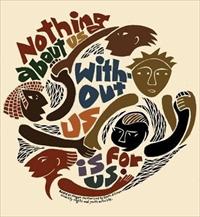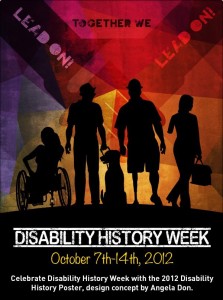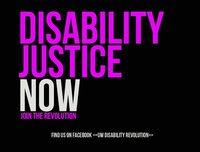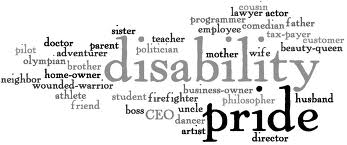Homelessness is a Disability Issue
“Nearly all of the long-term homeless have tenuous family ties and some kind of disability, whether it is a drug or alcohol addiction, a mental illness, or a physical handicap.” — Dennis Culhane, 2010
I spend a fair amount of time these days talking with people who live on the street. I distribute bag lunches three times a week in San Lorenzo Park and on Pacific Avenue in Santa Cruz. I stop and chat with people, and I listen to their stories. People are getting to know me now, and they say hello to me at the drugstore and at the bus station and on the street. Some of them I consider friends; others are just folks I exchange a few words with; still others say very little at all.
The number of disabled people living on the street in Santa Cruz is staggering. Most of the people I talk to are disabled. Either I see their disabilities at first glance or I hear about them when people talk about their lives. The most obvious are the people with visible disabilities: people who use wheelchairs but can only move them by shuffling their feet, people who need wheelchairs but can’t afford them, people who use walkers and push chairs on which all of their belongings are piled, people who are blind but have no cane and no guide dog. Then there are the people who are mentally ill: the ones who talk to the voices they hear, the vets with PTSD, the men and women laboring under severe depression. And then there are the ones with invisible disabilities: the middle-aged man who stims and rocks and self-talks at the bus stop, the older fellow with leg and back injuries, the young man who understands everything but has trouble speaking in words. And of course, there are the alcoholics and the drug addicts, including the ones who line up at the methadone clinic.
When we talk about homelessness, we don’t often talk about the sheer numbers of disabled people living without shelter. And when we talk about disability, we don’t often talk about how many disabled people end up on the street. We don’t talk enough about the ways in which disability puts people at risk of homelessness and about the ways in which homelessness puts people at risk of disability. But think about the level of physical vulnerability involved — the lack of medical care, the lack of decent food, the sexual and physical assaults, the constant vigilance — and it’s not difficult to see how people become disabled on the street. If you didn’t have PTSD before homelessness, you’ll probably have it once you’ve become homeless. If you didn’t have an alcohol problem before you became homeless, you might acquire one just to be able to sleep. If you weren’t physically disabled before you became homeless, you might become so through assault or untended injury. And if you weren’t ill before you became homeless, you might easily become so through chronic lack of sleep.
In Santa Cruz, it is illegal to sleep outdoors between 11 pm and 8:30 am, and in the library at any time. How are people supposed to find their way out of homelessness if they can’t even sleep? It boggles the mind.
And how can anyone can say that all people need to do is to quit being so lazy and get a job? Fine. You want people to quit sleeping outdoors? Find people a job that accommodates their disabilities. Locate accessible housing. Get people the assistive devices they need. Help people hire a support staff. I’m sure that any one of the people I’ve spoken to would be only too happy to sign right up.
The need out there is so great. Our disabled brothers and sisters are crying out for justice.
References
Culhane, Dennis. “Five Myths About America’s Homeless.” The Washington Post, July 11, 2010. Accessed September 12, 2013. http://www.washingtonpost.com/wp-dyn/content/article/2010/07/09/AR2010070902357.html.
© 2013 by Rachel Cohen-Rottenberg









julesinrose
9/13/2013 | 9:35 am Permalink
This made me cry. I’ve been looking for accessible housing and told the worker I met this week that the last time I tried to do that I was told I needed to become homeless first. She said, “really??!!” I’m sending a link to this to every social worker I have the email address of. Thank you again, Rachel.
Erik JM Schneider
9/13/2013 | 2:17 pm Permalink
I think I discovered your blog about a week ago, but I feel like a longtime reader because every single day you write something interesting and useful–and often something I wish I were writing about as well!
This post, for instance. I am trying to write about the many links among and between homelessness, disability, and addiction, and adding in trauma and abuse, as they have also been shown to be correlated with all three. There is, I think, a very convoluted and ugly knot where all of these things interact to produce a very large share–perhaps the largest–of social and cultural dysfunction in what is called the West.
I cannot back up this last claim yet, but I am working on it, albeit slowly. I am disabled with PTSD and depression; about three-quarters of my waking hours are spent keeping myself housed, fed, and stable enough to function at some acceptable-to-myself minimum.
This month I am in a surprise fight to keep payment of my SSI benefits uninterrupted. Needless to say, this is draining and distracting. Well, it is worse than that, but I will elaborate elsenet.
Here I will just say that the government seems happy to hold the threat of non-payment of benefits over my head on very very short notice even though such tactics are arguably as abusive as those used on me when I was little. Perhaps I would be less bother to them on the street.
My perception is that many of my contemporaries believe I belong on the street. And most everything about this feels like it is an outgrowth of an abusive culture.
Film at 11. On, um, some year before 2020, hopefully.
Thanks for making me think! Like, everyday!
julesinrose
9/14/2013 | 11:58 am Permalink
“. . .most everything about this feels like it is an outgrowth of an abusive culture.”
We live in a sadistic culture, imho. If you are able, read Chris Hedges’ “The Empire of Illusion,” though I warn anyone, it is difficult reading, and the chapter about pornography may be one to skip if there’s been sexual abuse. Very difficult.
I found reading it (and him, in general) to be empowering. When I can contextualize my suffering within a larger framework, it feels less personal. Somehow this makes it all more bearable. That’s me, though.
Erik JM Schneider
9/15/2013 | 2:19 pm Permalink
I think the Hedges book has been recommended to me before; I will see if I can find a copy.
Right off the top of my head, I would say the two most powerful titles I have read on this general topic[1] have been Dorothy Alison’s Bastard Out of Carolina and Alice Miller’s For Your Own Good and The Drama of the Gifted Child. Ok three titles.
Very different types of writing, and my reactions to each of them also different: Alison’s writings hit me in the heart and gut, while Miller’s offer some conceptual scaffolding to think through how we may have gotten here.
If this is where we are.
[1] Abusive culture, sadistic culture–even “moral” culture if, like mine, one’s abuse had anything to do with reinforcing evangelical protestant authority–these are all turning out to be a (several) very broad subject(s) involving almost every aspect of sociability, including but not limited to kinship and family relations. In fact I was just thinking this morning that it might be useful to refine some of these terms within whatever context this is. I think that “abuse” is often assumed to be obvious and easy to separate from “normality”, but I suspect that is a large part of why most abuse remains unrecognized and/or is kept quiet.
But I will do that on the server space I pay for.
Erik JM Schneider
9/15/2013 | 2:21 pm Permalink
Those were meant to be Cited Titles. Whoops.
Sean
9/17/2013 | 11:58 am Permalink
I’m bipolar and homeless. Many don’t think anything is wrong about and I get the “stop whining and get a job” comments and the like. The problem is at first appearance I look to be a normal 50ish white male but when you’ve spent time with me my disability becomes more apparent. This is why I can never keep a job, I do my work and I’m usually told I do a great job. The problem is my behavior is strange to others and they become uncomfortable around me and I’m almost always told I’m being let go because others can’t work around me.
I’ve tried medications but they only seem to make things worse. I’m disabled enough to be on SSI but it’s not enough to pay for rent, bills and food. It’s not enough to pay rent at all. I’m on a fixed income on the streets. I’ve come to terms that I will probably die on the streets. I know that sounds harsh but it’s there. I don’t think this is going to get better either. I know it will become epidemic and more elderly and disabled and abused neglected people will be on the streets not in a few years but in months we will see a flood as landlords figure out how much money they can make by accepting they can make more money renting for double the price for half the time then keeping units rented full time for full time. (less maintenance cost, repair bills and an empty apartment/house is a write off on top of it.) Greed is an addiction too, it kills community and relationships. Unfortunately greed is seen as an asset and a good thing for everyone. *http://www.forbes.com/sites/jakezamansky/2013/08/13/the-song-remains-the-same-on-wall-street-greed-is-good/
http://www.cbsnews.com/8301-505125_162-37441183/greed-is-good-why-you-need-to-tap-into-your-inner-gordon-gekko/
My thoughts
Sean
Rachel Cohen-Rottenberg
9/17/2013 | 7:32 pm Permalink
Sean, I am always so aware of how quickly things shift and people end up on the street. I hope you stay safe and well. Please feel free to email me if you need to.
Don Gateley
9/21/2013 | 4:52 pm Permalink
I am so happy to see your involvement with this. I found myself homeless in Los Gatos almost 20 years ago. Everything was going along as it had for all of a reasonably prosperous life as a programmer/engineer when lightening struck and I found without a job or prospects for employment (early 50′s in a young person’s game.) My savings ran out before I could find work and I found myself living in my car and then without even that.
If I hadn’t a disability prior, the complete disorientation resulting from the situation I so suddenly found myself in was sufficiently disabling and depressing that I started self medicating with alcohol for anesthesia and the rest of the nasties then followed pretty much as can be expected. Only a miracle inheritance, modest though it was, permitted me to escape that awful, filthy hole wherein the gutter is too high to reach for. I am certain I would have died out there without that miracle.
I discovered what it is like to be invisible. Literally and actually. I had people accidentally try to walk through me. After it was behind me I realized how invisible the people in the situation that I escaped had been prior to my experience of it. They are no long invisible. They are stark.
Thank you for not needing the experience I had in order to see them and understand their plight. Society has no will to help with this problem and is taking many measures to worsen it. Only reporting such as yours can possibly make a difference and I am very pessimistic about even that given the ugly psychological profile that americans have evolved into.
I am old enough to have seen almost that entire relentless and crushing devolution and feel little hope for its reversal but there is no hope at all without people like you.
Rachel Cohen-Rottenberg
9/21/2013 | 10:46 pm Permalink
Don, I can’t tell you how much it means to me to read everything you’ve written. I have been struggling with the limits of my own body, wishing that I could do more for people, but having to take care of my own physical needs so that I can continue to serve as I do now. I sometimes feel that I can never do enough, and it’s true, I can’t. The problems are too deep and wide for one person to solve. But I can do something. And I appreciate your telling me that that something means a lot.
That feeling of invisibility you talk about is very familiar to me. I have not been on the street, but I experienced that feeling of invisibility for over 10 years in my last community, being treated as though I didn’t exist. It was an awful, traumatic experience that has forever changed me. When I go to give out lunches in the park, one of the things I notice is that people sometimes look surprised that I actually see them and talk to them with respect. I recognize that look of shock at being seen and treated as a human being. Since moving to California, I’ve gotten used to being treated like a person again, but the memory of chronic invisibility is never far. It’s part of why I do what I do.
Kiki
2/16/2014 | 2:57 pm Permalink
Your post caught my eye while googling homelessness and disabilities, and I’m so pleased to see the broader scope of what you’re doing with this blog. I was homeless most of last year as well as off and on throughout my life. Prior to my becoming disabled several years ago with mental health, chronic pain and a debilitating auto accident last summer, my temporary bouts with homelessness were in my mind “transitional” during which I was relatively confident with the resources I had because I still had my health. I always said, “as long as I have my health I have everything because I know how to make money.” Well, in 2009 my mental health and eventually physical health took a nose dive and I have never recovered since because I cannot get the help I need to overcome them. Our nation has such a disdain for disabled people and once you become homeless they do NOT come out of the woodwork to help you like julesinrose said. It only gets worse. To boot, my mom and stepsiblings kicked me down even further. An estranged aunt came to my rescue and has gotten me out of my van so I am truly one of the blessed, but I am still disabled without money and getting the shaft from SSA disability. I wrote about it here http://kikiunhinged.wordpress.com/2014/01/26/how-ssa-disability-barriers-are-killing-a-patriot/
Thanks so much for giving me important validation for my next post as I’m working on one re disability and homelessness.
Keep writing. You are NOT invisible!
Trackbacks & Pingbacks
[…] Fear, ambivalence, stupidity, self-absorption and narcissism, that’s why. I’m over it. Homeless haters, just shut the hell up already. You just make yourselves look stupid by speaking. But if you’d like to redeem yourselves, go ahead and educate yourselves about homelessness as a disability issue. Here’s a good place to start [Disability and Representation]. […]